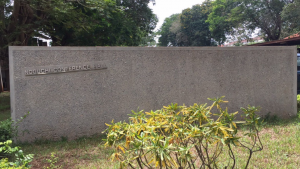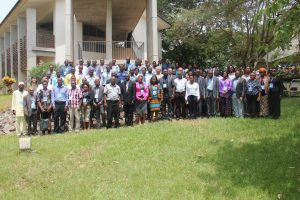ASLM Supports the Africa Regional Flu Workshop in Ghana
 The World Health Organization (WHO) warns that a global influenza (flu) pandemic remains a real threat.[1] Many countries around the world are still ill-prepared to tackle a flu pandemic, including many countries in Africa. Furthermore, there have been recent Avian flu outbreaks reported in poultry farms and wild flocks across Africa, and there is great concern of another potential bird-to-human outbreak.[2] In order to help strengthen the seasonal and rapid response and surveillance for pandemic flu in the African region, the Noguchi Memorial Institute for Medical Research (NMIMR) in Accra, Ghana, together with the US Centers for Disease Control and Prevention (CDC), WHO and the African Society for Laboratory Medicine (ASLM) hosted a flu workshop for African laboratory scientists, epidemiologists, and veterinarians from 3-7 April 2017.Sixty participants from 20 different African countries improved their technical skills, shared their experiences and networked for more efficient collaboration during future flu outbreaks in Africa.
The World Health Organization (WHO) warns that a global influenza (flu) pandemic remains a real threat.[1] Many countries around the world are still ill-prepared to tackle a flu pandemic, including many countries in Africa. Furthermore, there have been recent Avian flu outbreaks reported in poultry farms and wild flocks across Africa, and there is great concern of another potential bird-to-human outbreak.[2] In order to help strengthen the seasonal and rapid response and surveillance for pandemic flu in the African region, the Noguchi Memorial Institute for Medical Research (NMIMR) in Accra, Ghana, together with the US Centers for Disease Control and Prevention (CDC), WHO and the African Society for Laboratory Medicine (ASLM) hosted a flu workshop for African laboratory scientists, epidemiologists, and veterinarians from 3-7 April 2017.Sixty participants from 20 different African countries improved their technical skills, shared their experiences and networked for more efficient collaboration during future flu outbreaks in Africa.
The training objectives were to review flu sample collection and shipment methods, present current protocols for flu virus detection, learn more about the global platforms for flu data sharing, and to discuss and share information about the recent Avian flu outbreak threat to Africa. In addition, new tools for pandemic risk assessment (TIPRA) were introduced and participants were trained in the One Health approach to rapid response for pandemic flu.
Throughout the week, stakeholders had an opportunity to exchange experiences about the individual efforts made in their respective countries and also to discuss ways to improve regional and continental networking, capacity building and surveillance for respiratory infections. The participants highlighted the need to establish better testing methods and to improve the efficiency of the response to outbreaks. As such, they emphasized the importance of networking and communication between African stakeholders in order to enable a collaborative and more rapid response to outbreaks.
The workshop was very interactive, with high-level expert presentations, case studies, group work, and open discussions. Various subjects were tackled during the week, including:
• Avian Flu – the ongoing pandemic threat
• Protocols for flu virus detection
• Rapid antigen testing for Avian Flu – pros and cons
• Sample collection, shipping protocols, Shipping fund project
• Global data platforms
• Tools for pandemic risk assessment
• Avian flu veterinary perspective
• Status of the implementation of the Pandemic Flu Preparedness in the WHO African Region
• One Health approach in the WHO African Region : Best practices
• One Health approach to Avian Flu
• Risk communication
• International Health Regulations (IHR) notification of new flu subtypes
In conclusion, the participants and facilitators were satisfied with the workshop outcomes. Primarily, participants appreciated learning more about the One Health approach and its multi-sectorial nature of addressing public health at the intersection of human, domestic animal, wildlife and environmental factors. It was extremely beneficial to have joined human health and animal health experts during this workshop. They also highlighted the importance of delocalizing the One Health approach to rural regions, as this is where outbreaks are most likely to begin.
Of particular note as expressed by the participants throughout the week was the urgent need to establish, reinforce and formalize networking in Africa to strengthen and enable collaborative outbreak responses. Participants also raised the importance of transparency from their country leadership during outbreak situations, as outlined during the risk communication discussions. The risk communication discussion emphasized that the key points for an effective response were for countries to: “be first, be fast, be frequent, be proactive, and be transparent.”
Finally, the country representatives expressed that while these workshops were helpful to them as health technicians, an important complement was to sensitize their country leadership about the true threat of pandemic flu and the need to invest to prevent and control its spread. They felt that their government decision makers should be convened to learn about ways to collaboratively prevent, respond and manage outbreak situations and discuss regional border control issues in the case of outbreaks. They expressed hope that the newly established Africa CDC would allow Africa to more independently and effectively respond to outbreaks on the continent and agreed that future such workshops reuniting delegates from 20 different African countries were important steps toward strengthening collaborations in Africa.
By: Koudedia Konaté and Mah-Séré Keita; Editor: Bethanie Rammer
[1] Mary Ann Benitez and Carain Yeung. WHO warns of H7N9 pandemic. The Standard (Hong Kong). [Internet] 2016 December 15. [Cited 2017 May 18] http://www.thestandard.com.hk/section-news.php?id=177527
[2] WHO. Influenza at the human-animal interface: Summary and assessment, 16 March to 20 April 2017 [Internet]. Geneva: World Health Organization; 2017 April 20. [Cited 2017 May 18] http://www.who.int/influenza/human_animal_interface/Influenza_Summary_IRA_HA_interface_04_20_2017.pdf?ua=1

